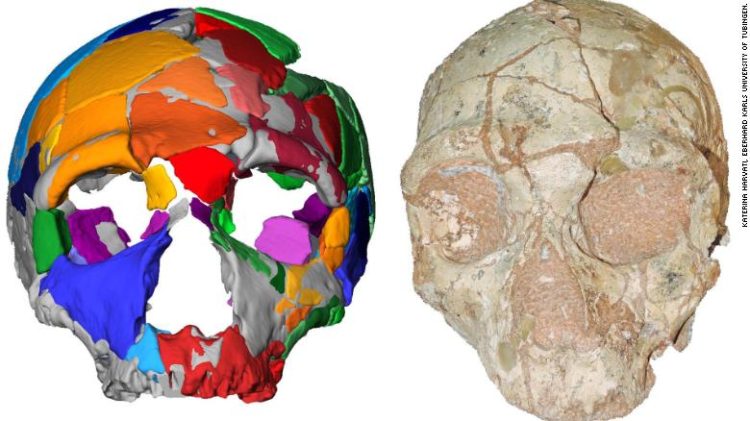By Ashley Young-
Scientists claim to have identified the earliest sign of our species outside Africa, after a skull fragment recovered from a cave in southern Greece was discovered. The skill fragment found in the cave in the 1970’s is estimated to be at least 210,000 years old, making it 16,000 or more years older than an upper jaw bone from Israel that was reported last year.
The startling discovery suggests our species began leaving Africa much earlier than previously thought, researchers reported Wednesday. None of the descendants of the travellers to Greece is alive today. Other researchers concluded that the exodus from Africa leading to our worldwide spread occurred 100,000 years later. The new work is the latest sign of earlier, dead-end exits from the continent where Homo sapiens evolved.
Both skulls were found in a block of breccia, or broken fragments of rock and fossil cemented together, wedged high between the walls of the Apidima Cave in southern Greece. The skulls were discovered in 1978, when the National and Kapodistrian University of Athens was conducting research.
The breccia was dated to between 100,000 and 190,000 years old at the time. The skulls were not removed from the breccia and remained at the museum. Given the fragmentary nature of the skulls, they were difficult to remove and clean, though that eventually happened in the 1990s. The fossil from the rear of a skull, was actually found decades ago — excavated in the late 1970s from the Apidima Cave in the southern Peloponnese region of Greece and later kept in a University of Athens museum.
“Not a lot of attention was paid to it,” said Katerina Harvati of the University of Tuebingen in Germany, who was invited to study the fossil.
Harvati and others report the results of their analysis in the journal Nature. To establish the age, they analysed bits of bone from the fossil. To identify what species it came from, the researchers compared a virtual reconstruction to the shapes of fossils from known species.
Credits: Composite Image courtesy of Katerin Harvety, Eberhard Karls University Of Tubingen




